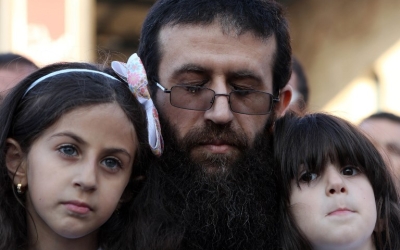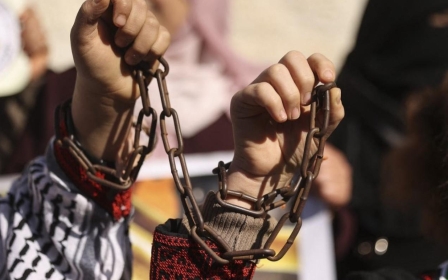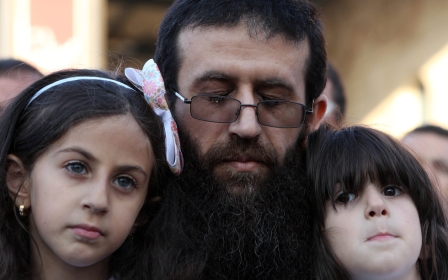Palestinian hunger striker Khader Adnan dies in Israeli prison

Prominent Palestinian activist Khader Adnan died on Tuesday in an Israeli prison after nearly three months of hunger strike.
Adnan, a member of the Palestinian Islamic Jihad resistance group, had been on hunger strike in protest at his detention since 5 February, when he was arrested at his home in Arraba, a town in the occupied West Bank south of Jenin.
News of his death prompted rocket fire from the Gaza Strip, a shooting wounding a settler in the occupied West Bank, and calls for a general strike and protests across Palestinian cities.
The 45-year-old is the first Palestinian prisoner to have died from a hunger strike in Israeli custody since 1992. Six other Palestinian detainees died in similar circumstances in different mass hunger strikes in 1970, the early 1980s and 1992.
Adnan's health had been in decline over the past few weeks, with his family warning that he was dying and accusing Israel of medical negligence for refusing to transfer him to a civilian hospital.
New MEE newsletter: Jerusalem Dispatch
Sign up to get the latest insights and analysis on Israel-Palestine, alongside Turkey Unpacked and other MEE newsletters
Israeli authorities said Adnan "refused to undergo medical tests and receive medical treatment" and "was found unconscious in his cell" in Nitzan prison near Ramleh early in the morning.
Israeli rights group Physicians for Human Rights Israel (PHRI) said it had tried to convince Israeli authorities, including the Israeli health ministry and Israel prison service, to admit Adnan to hospital to be monitored as his health deteriorated, but was rejected.
A few days before his death, PHRI’s chairwoman Lina Qasem-Hasan examined Adnan and concluded in a medical report that he was in immediate need to be transferred to hospital for observation.

“These attempts were unsuccessful, including personal appeals and court interventions with these parties,” PHRI said in a statement.
It added that Israeli security services also rejected requests for Adnan’s family to visit him “when it was clear this could be their last meeting”.
Former Palestinian prisoner Mohamed al-Qeeq, who went on a hunger strike in 2016 for 94 days, said Adnan’s arrest from his home in occupied land was a violation of international law.
Qeeq described the charges against Adnan as "fabricated". He said repeatedly placing Adnan in administrative detention and attempting to convict him were "crimes" aimed at keeping him in prison.
"All these scenes culminated in his silent assassination without the presence of a committee to investigate or offer clarity on his fate," he told Middle East Eye.
"He didn’t have weapons, he only took up the most peaceful resistance in the world, his hunger strike, to reject the injustice of the jailer."
History of hunger strikes
Amin Shoman, head of the Palestinian Authority's Supreme Commission for Prisoners and Ex-Detainees Affairs, said Adnan's death is the consequence of deliberate policy against Palestinian detainees by the Israeli prison authorities.
"This is a new crime committed by Israel inside its prisons, and it deliberately continues its policy of medical negligence against thousands of prisoners, not responding to their just and humane demands, and turning its back on all international norms and laws," he told MEE.
Shoman blamed Israel's far-right government, which has implemented a series of harsh measures targeting Palestinian prisoners, for Adnan's death.
"We will witness more martyred prisoners during the coming days and months if the policies of the current Israeli government against thousands of prisoners continue," he said.
'He only took up the most peaceful resistance in the world, his hunger strike, to reject the injustice of the jailer'
- Mohamed al-Qeeq, former Palestinian hunger striker
After Adnan's death was announced, three rockets were launched from the Gaza Strip into southern Israel, falling in open areas, Israel's military said.
Palestinians called for a general strike in the West Bank and Gaza, and protests were expected later in the day.
According to the Palestinian Prisoners Association, an NGO supporting detainees, Adnan had been detained by Israel 12 times, spending around eight years in prison, mostly under administrative detention, a policy that allows Israel to hold a person without trial or charge indefinitely.
During his times in detention, Adnan was a spokesperson for Palestinian prisoners and went on hunger strike five times.
His first hunger strike took place after he was arrested in 2004, protesting being held in administrative detention.
A 2012 hunger strike, which lasted for 67 days, inspired a wave of Palestinian prisoners held under administrative detention to join him and copy his method.
Middle East Eye delivers independent and unrivalled coverage and analysis of the Middle East, North Africa and beyond. To learn more about republishing this content and the associated fees, please fill out this form. More about MEE can be found here.




